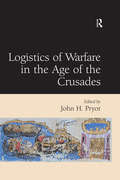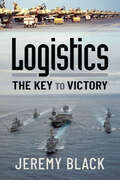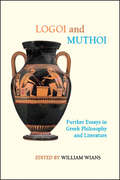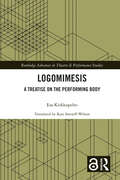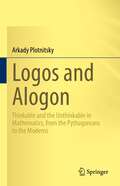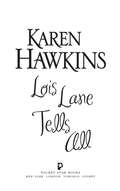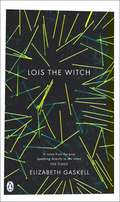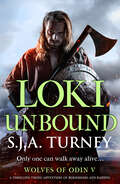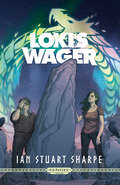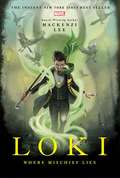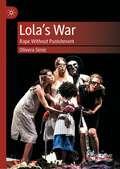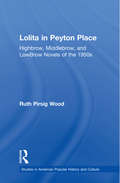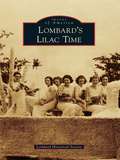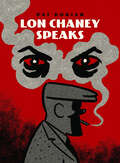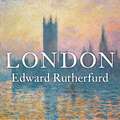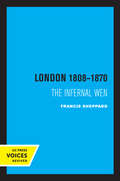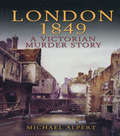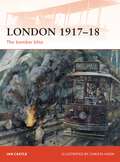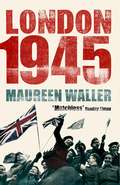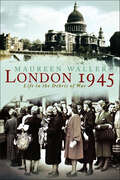- Table View
- List View
Logistics of Warfare in the Age of the Crusades
by John H. PryorHow were the Crusades made possible? There have been studies of ancient, medieval and early modern warfare, as well as work on the finances and planning of Crusades, but this volume is the first specifically to address the logistics of Crusading. Building on previous work, it brings together experts from the fields of medieval Western, Byzantine and Middle Eastern studies to examine how the marches and voyages were actually made. Questions of manpower, types and means of transportation by land and sea, supplies, financial resources, roads and natural land routes, sea lanes and natural sailing routes - all these topics and more are covered here. Of particular importance is the attention given to the horses and other animals on which transport of supplies and the movement of armies depended.
Logistics: The Key to Victory
by Jeremy BlackThis wide-ranging military history examines the vital yet overlooked role of logistics through the global evolution of warfare.An army cannot operate without supplies, yet military researchers and historians often overlook the essential aspect of logistics. In this comprehensive study, Jeremy Black provides an informative yet concise world history of military logistics through the ages.With special focus on key conflicts, Black examines such factors as climate, geography, food supplies, welfare of troops, payment, transport, communications, terrain, and distance. He also considers related factors including government policy, stability, and financial conditions. He covers the sweep of history, from ancient and medieval times to modern eras of industrial warfare, highlighting technological advances from oil and steam to cyber warfare and smart weapons.
Logoi and Muthoi: Further Essays in Greek Philosophy and Literature (SUNY series in Ancient Greek Philosophy)
by William WiansIn Logoi and Muthoi, William Wians builds on his earlier volume Logos and Muthos, highlighting the richness and complexity of these terms that were once set firmly in opposition to one another as reason versus myth or rationality versus irrationality. It was once common to think of intellectual history representing a straightforward progression from mythology to rationality. These volumes, however, demonstrate the value of taking the two together, opening up and analyzing a range of interactions, reactions, tensions, and ambiguities arising between literary and philosophical forms of discourse, including philosophical themes in works not ordinarily considered in the canon of Greek philosophical texts. This new volume considers such topics as the pre-philosophical origins of Anaximander's calendar, the philosophical significance of public performance and claims of poetic inspiration, and the complex role of mythic figures (including perhaps Socrates) in Plato. Taken together, the essays offer new approaches to familiar texts and open up new possibilities for understanding the roles and relationships between muthos and logos in ancient Greek thought.
Logomimesis: A Treatise On The Performing Body (Routledge Advances in Theatre & Performance Studies)
by Esa KirkkopeltoHow can the dichotomy between body and language be overcome by means of the performing arts? What does the art of performing contribute to philosophical, ethical, and political thinking today?This book is a study of the body and language on the stage. Inspired by contemporary artistic research and performance philosophy, Esa Kirkkopelto proposes a new understanding of embodiment that has no direct counterpart in existing philosophies of the body, in natural science, or in everyday experience. The way a performer imagines their body in performance breaks with body–language dichotomies, so language and body can be conceived as co-original phenomena, beyond their anthropomorphic framing. Once we recognize the native relationship between body and language, we can acquire an evolutive perspective which reaches beyond ontological or transcendental paradigms, towards a more linguistic and corporeal coexistence of diverse beings.This book shows how radically different the universe appears when conceived through the performing body. It addresses artists and philosophers alike.
Logos and Alogon: Thinkable and the Unthinkable in Mathematics, from the Pythagoreans to the Moderns
by Arkady PlotnitskyThis book is a philosophical study of mathematics, pursued by considering and relating two aspects of mathematical thinking and practice, especially in modern mathematics, which, having emerged around 1800, consolidated around 1900 and extends to our own time, while also tracing both aspects to earlier periods, beginning with the ancient Greek mathematics. The first aspect is conceptual, which characterizes mathematics as the invention of and working with concepts, rather than only by its logical nature. The second, Pythagorean, aspect is grounded, first, in the interplay of geometry and algebra in modern mathematics, and secondly, in the epistemologically most radical form of modern mathematics, designated in this study as radical Pythagorean mathematics. This form of mathematics is defined by the role of that which beyond the limits of thought in mathematical thinking, or in ancient Greek terms, used in the book’s title, an alogon in the logos of mathematics. The outcome of this investigation is a new philosophical and historical understanding of the nature of modern mathematics and mathematics in general. The book is addressed to mathematicians, mathematical physicists, and philosophers and historians of mathematics, and graduate students in these fields.
Logos, Tao und Ereignis: Martin Heidegger und das zukünftige Denken (Persönlichkeit und weltpolitische Gestaltung)
by Sun ZhouxingDie Begriffe Logos, Tao und Ereignis stehen im Zentrum dieser Aufsatzsammlung, die sich auf das künftige Denken im Ausgang von Martin Heideggers Philosophie unter der Voraussetzung der Geschichtlichkeit des Seins und unter Einbezug der multikulturellen Ressourcen der Menschheit bezieht. Unter den philosophischen Diskursen des 20. Jahrhunderts ist Heideggers Ereignis wahrscheinlich das rätselhafteste. Der Autor hat diese acht Aufsätze, die erstmals in deutscher Sprache erscheinen, auf verschiedene Art und Weise überarbeitet, erweitert und verbessert sowie inhaltlich und formal vereinheitlicht. So erhält eine Heidegger-Interpretation aus chinesischer Perspektive Eingang in die Wirkungs- und Rezeptionsgeschichte des deutschen Philosophen.
Lois Lane Tells All (Talk of the Town #2)
by Karen HawkinsNew York Times bestselling author Karen Hawkins returns to Glory, North Carolina, for another delightful story of love and laughter.She thinks she's Lois Lane . . .Susan Collins always wanted to be a hard-hitting reporter, but there's not much call for her talents in sleepy Glory, North Carolina. Then the Murder Mystery Club--a trio of enterprising octogenarians--decides to open their own CSI lab at the assisted-living center. And when strange "accidents" begin to happen around town, Susan senses she could be on to the news story of her dreams.He doesn't want to be her Superman . . .Mark Tremayne has returned to Glory to take over as CFO of The Glory Examiner. His job is to keep the newspaper profitable, which means covering the annual Baptist Church Bake-Off and selling ads for the county fair--not allowing his too-sexy-for-her-own-good reporter to hare off after a wild story that could alienate some of the townspeople.Together . . . they're Kryptonite.Mark's and Susan's viewpoints could be from different planets, but their mutual attraction is in total alignment. Despite their arguments, the indomitable redhead and the hot accountant are a sexual explosion waiting to happen. And when it does, Glory had better watch out!
Lois the Witch: And Other Stories (Pocket Penguin Classics Ser. #Vol. 7)
by Elizabeth GaskellFear of Satan becomes murder in the name of God.Newly orphaned, the God-fearing and heart-broken Lois is sent across the Atlantic to live with her uncle’s family in Salem, but on her arrival she finds herself the object of cruel hostility, potent jealousy and mad desire. When the local Pastor’s daughters are contorted and convulsed by apparently satanic powers, the whole town is whipped into a hysterical witch hunt. And when Lois’s cousins start to resent her presence in their household, life becomes precarious and an old woman’s curse returns to haunt her.
Loki Unbound: A thrilling Viking adventure of berserkers and raiding (Wolves of Odin)
by S.J.A. TurneyThe Wolves of Odin must bring a rogue Viking chief to heel, in the rolling Yorkshire Dales… AD 1044. Fleeing the machinations of William the Conqueror in France, the Wolves of Odin set sail for Britain. They make for the north of the country, heading to Jorvik – Viking York. Its earl, Sigurd, doesn’t believe they have arrived with peaceable intentions. To prove their good faith, he challenges them to fix a problem for him… North of Jorvik, in the Dales, a rogue Viking warlord, Arkil, resists Sigurd’s rule with a small army. Sigurd’s forces are spread too thin to deal with him directly, and so it falls to the Wolves… The pulse-pounding fifth installment in the Wolves of Odin series, with a thrilling mission in northern England. Perfect for fans of Angus Donald and Matthew Harffy.
Loki's Wager (Vikingverse)
by Ian Stuart SharpeTHERE ARE SOME BOUNDARIES THAT SHOULD NEVER BE CROSSEDMidgard is a funeral pyre. Ragnarök, the doom of the gods, has brought the Empire of the Heavens to ruin.For some, the harrowing promises a new beginning. Mother Jörð will rise again, and new gods will return to the golden tables of old. But Iðunn Lind, keeper of the great World Tree Yggdrasil, no longer believes in ancient prophecy or the hand of fate.Across the veil, Churchwarden Michaels is stuck dealing with his own personal Ragnarök - and just how to save his neck now that three Viking crosses have appeared overnight at St. Mary's.When the boundaries between realities fracture, the two guardians discover that the gods not only play dice with the Vikingverse, they are rolling snake-eyes.In this new chapter of the Vikingverse, the tapestry of time unfurls in deadly new ways:•An Arabian ambassador faces a dead reckoning in Viking Ireland•A Jomsviking Jarl sails to far-flung lands beyond the record of the sagas•A lone Runesmith defends the Pax Nordica against the Mongol horde THE RESURRECTION IS AT HAND, AND HEAVEN ON EARTH AWAITS THE FAITHFUL - BUT WILL THE FUTURE BE KRISTIN OR ÆSIR?
Loki: Where Mischief Lies
by Mackenzi Lee Stephanie HansThis is the first of three young adult novels from New York Times best-selling author Mackenzi Lee that explores the untapped potential and duality of heroism of popular characters in the Marvel Universe. <p><p> Before the days of going toe-to-toe with the Avengers, a younger Loki is desperate to prove himself heroic and capable, while it seems everyone around him suspects him of inevitable villainy and depravity . . . except for Amora. Asgard's resident sorceress-in-training feels like a kindred spirit-someone who values magic and knowledge, who might even see the best in him. <p> But when Loki and Amora cause the destruction of one of Asgard's most prized possessions, Amora is banished to Earth, where her powers will slowly and excruciatingly fade to nothing. Without the only person who ever looked at his magic as a gift instead of a threat, Loki slips further into anguish and the shadow of his universally adored brother, Thor. <p> When Asgardian magic is detected in relation to a string of mysterious murders on Earth, Odin sends Loki to investigate. As he descends upon nineteenth-century London, Loki embarks on a journey that leads him to more than just a murder suspect, putting him on a path to discover the source of his power-and who he's meant to be.
Loktantrik Rajneeti
by National Council Of Educational Research TrainingThis book prescribed by central board of secondary education, India for the students of class 9th subject Social Science, studying through hindi medium. This accessible version of the book doesn’t leave any part of the book. The book is handy companion of the school and university students desiring to read facts in interesting way. NCERT books are must read for aspirants of competitive and job related examinations in India.
Loktantrik Rajneeti -2
by National Council Of Educational Research TrainingThis book prescribed by central board of secondary education, India for the students of class 10th subject Social Science, studying through hindi medium. This accessible version of the book doesn’t leave any part of the book. The book is handy companion of the school and university students desiring to read facts in interesting way. NCERT books are must read for aspirants of competitive and job related examinations in India.
Lola’s War: Rape Without Punishment
by Olivera SimicThis longitudinal study is based on the story of Lola, who was gang raped during the war in Bosnia and Herzegovina in 1992. At the time, she was in a detention camp with her young children. Only one of Lola’s several perpetrators was convicted but his sentence of six years of imprisonment has never been actioned by the Bosnian judiciary. Lola’s rapist is still free and she lives in continual fear that he will retaliate against her and her children for her role in his trial.
Lolita in Peyton Place: Highbrow, Middlebrow, and LowBrow Novels of the 1950s (Studies in American Popular History and Culture)
by Ruth Pirsig WoodFirst published in 1995. Routledge is an imprint of Taylor & Francis, an informa company.
Lombard's Lilac Time
by Lombard Historical SocietyLombard has been called the "Lilac Village" since the late 1920s when William R. Plum, affectionately known as the "Colonel," bestowed his world-renowned lilac collection to the village for use as its first public park. Colonel Plum's 2.5-acre estate was known as Lilacia and began in 1911 after a trip to the Lemoine Lilac Gardens in France. By the time Plum passed away in 1927, he had amassed over 200 varieties of lilacs and had the largest collection of French hybrids in the world. Jens Jensen, the famous landscape architect, designed a public space out of Plum's lilac collection with winding paths of native limestone, tulips by the thousands, and a lily pond in the park. The first community-wide Lilac Festival was held in May of 1930, unveiling Jensen's Lilacia and including a Lilac Queen and Court, a pageant, parade, and wide variety of events and festivities celebrating the village's new park.
Lon Chaney Speaks (Pantheon Graphic Library)
by Pat DorianA stunning graphic debut: the life of the legendary silent-film actor Lon Chaney (the original Phantom of the Opera and Hunchback of Notre Dame), as imagined by an artist whose work recalls the style and skill of early-era New Yorker cartoonists.From the artist: "'No one will ever love me!' I believe it was this near-universal fear that makes Lon Chaney's characters continue to resonate with us today. On their surface, most of them are distinctly unlikeable: they are monsters, outcasts, criminals. But through his unique magic, Chaney makes them empathetic. He pioneered the craft of makeup artist long before that term ever existed, and he used his expertise to hide himself from public view--what if nobody loved him?"PART OF THE PANTHEON GRAPHIC LIBRARY
London
by Edward RutherfurdA wonderful, epic story that tells the history of the greatest city in the world, from Roman times to the present day from the author of Paris, Sarum and New York.London has perhaps the most remarkable history of any city in the world. Now its story has a unique voice. <p><p>In this epic novel Edward Rutherfurd takes the reader on a magnificent journey across sixteen centuries from the days of the Romans to the Victorian engineers of Tower Bridge and the era dockland development of the modern day. Through the lives and adventures of his colourful cast of characters he brings all the richness of London's past unforgettably to life.(P)2018 Hodder & Stoughton Limited
London
by Robert O. Bucholz Joseph P. WardBetween 1550 and 1750 London became the greatest city in Europe and one of the most vibrant economic and cultural centres in the world. This book is a history of London during this crucial period of its rise to world-wide prominence, during which it dominated the economic, political, social and cultural life of the British Isles, as never before nor since. London incorporates the best recent work in urban history, contemporary accounts from Londoners and tourists, and fictional works featuring the city in order to trace London's rise and explore its role as a harbinger of modernity, while examining how its citizens coped with those achievements. London covers the full range of life in London, from the splendid galleries of Whitehall to the damp and sooty alleyways of the East End. Readers will brave the dangers of plague and fire, witness the spectacles of the Lord Mayor's Pageant and the hangings at Tyburn, and take refreshment in the city's pleasure-gardens, coffee-houses and taverns.
London 1808-1870: The Infernal Wen
by Francis SheppardThis title is part of UC Press's Voices Revived program, which commemorates University of California Press’s mission to seek out and cultivate the brightest minds and give them voice, reach, and impact. Drawing on a backlist dating to 1893, Voices Revived makes high-quality, peer-reviewed scholarship accessible once again using print-on-demand technology. This title was originally published in 1971.
London 1849: A Victorian Murder Story
by Michael AlpertLondon 1849: the city is filthy, plagued, criminal and filling up with refugees from the Irish Famine and the revolutionary wars on the continent...but it is on the brink of reform as stations are built, rioters pardoned and the Great Exhibition planned. The heaving city is the backdrop for the most sensational crime and trial of the decade: the Manning murder case. Throughout the sticky summer the people of London obsessed over the fate of a dominant mysterious woman and her weak husband as the full detail of their slaughter of her lover unfolded. London 1849 follows the murder, trial and execution of the couple, interweaving the scene that was London at the time: crime, noise, cholera, overpacked slums, prostitution, law and order, prisons, fashion, shopping, finance, transport, Marx and Dickens.
London 1917-18
by Christa Hook Ian CastleOsprey's Campaign title for the Gotha and the massive Staaken 'Giant' bomber raids against London during World War I (1914-1918). On a sunny May afternoon in 1917, the peace of an English seaside town was shattered when a flight of German Gotha bombers appeared without warning. Twenty-three Gothas had set out to attack London in this first bomber raid, but heavy cloud forced them to target Folkestone and the Shorncliffe army camp instead. It was the start of a new phase of the war aimed at destroying the morale of the British people. London's defences were quickly overhauled to face this new threat, providing the basis for Britain's defence during World War II.
London 1945
by Maureen WallerLondon at the outset of war in 1939 was the greatest city in the world, the heart of the British Empire. The defiant capital had always been Hitler's prime target and 1945, the last year of the war, saw the final phase of the battle of London. The Civil Defence could not have succeeded without the spirit, courage, resilience and co-operation of the people. London 1945 describes how a great city coped in crisis, how morale was sustained, shelter provided, food and clothing rationed, and work and entertainment carried on. Then, as the joy of VE Day and VJ Day passed into memory, Londoners faced severe shortages and all the problems of post-war adjustment. Women lost the independence the war had lent them, husbands and wives had to learn to live together again, and children had a lot of catching up to do.The year of victory, 1945, represents an important chapter in London's - and Britain's - long history.
London 1945: Life In The Debris Of War
by Maureen WallerLondon at the outset of war in 1939 was the greatest city in the world, the heart of the British Empire. The defiant capital had always been Hitler's prime target and 1945, the last year of the war, saw the final phase of the battle of London. The Civil Defence could not have succeeded without the spirit, courage, resilience and co-operation of the people. London 1945 describes how a great city coped in crisis, how morale was sustained, shelter provided, food and clothing rationed, and work and entertainment carried on. Then, as the joy of VE Day and VJ Day passed into memory, Londoners faced severe shortages and all the problems of post-war adjustment. Women lost the independence the war had lent them, husbands and wives had to learn to live together again, and children had a lot of catching up to do.The year of victory, 1945, represents an important chapter in London's - and Britain's - long history.
London 1945: Life in the Debris of War
by Maureen WallerLondon at the outset of World War II in 1939 was the greatest city in the world, the heart of the British Empire. By 1945, it was a drab and exhausted city, beginning the long haul back to recovery.The defiant capital of England had always been Hitler's prime target. The last months of the Second World War saw the final phase of the battle of London as the enemy unleashed its new vengeance weapons, the flying bombs and rockets. They were terrifying and brought destruction on a vast scale, but fortunately came too late to dent morale seriously.The people of London were showing the spirit, courage, and resilience that had earned them the admiration of the world during a long siege. In the harshest winter of fifty years, they were living in primitive conditions. Thousands were homeless, living in the Underground and deep shelters. Women lined up for horse meat and were lucky to obtain one egg a month. They besieged emergency coal dumps. Everyone longed for peace.The bright new world seemed elusive. As the victory celebrations passed into memory, there were severe hardships and all the problems of post-war adjustment. Women lost the independence the war had lent them, husbands and wives had to learn to live together again, and children had a lot of catching up to do.Yet London's loss has often been its opportunity. Its people had eagerly embraced plans for a modern metropolis and an end to poverty. They voted overwhelmingly for a Labour government and the new, fairer social order that was their reward for all they had endured.The year of victory, 1945, represents an important chapter in London's---and Britain's---long history. Acclaimed historian Maureen Waller draws on a rich array of primary sources, letting the people tell their own story, to re-create that moment, bringing to it the social insight at which she excels.
